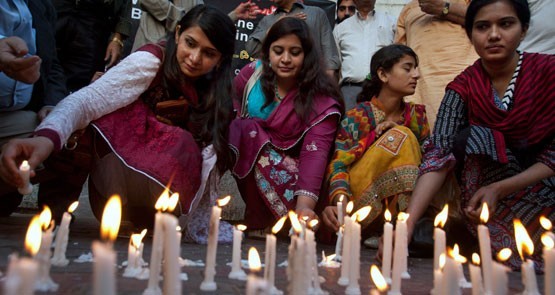
Violence is out of place anywhere. I have to remind myself of this when I see reports of violence in places with which I’m familiar, which hold happy memories for me, which are home to people who I care about. And then I remind myself that there is no place on Earth where violence is a stranger. “How can this happen here?” is an instinctive protective response, but violence has almost always happened here — wherever “here” may be — at some point in the not-too-distant past. Violence is out of place everywhere and nowhere. Why not London, or Paris, or Brussels, or Sydney?
And why not Lahore?
None of this reasoning reduced the shock of seeing the photographs of carnage and bloodshed in the park where my own young daughter and I had enjoyed a happy outing over a decade ago during a visit to Lahore, Pakistan. I dug out a battered photograph of her perched triumphantly on the deck of a wooden fort, making the V for victory sign, a broad smile across her face. How could children have been slaughtered on a holiday excursion to play on the swings and carousels in the same park?
Of course, that was the point of the Sunday’s attack, which killed at least 72 people — scores of them children — as they celebrated the Easter holiday. In claiming responsibility for the attack, the Jamaat-ul-Ahrar Taliban faction claimed to be punishing Christians for their abhorrent beliefs — a community that was targeted in the bombing of a church in Lahore last year. However, the Easter bombing was also a message to Prime Minister Nawaz Sharif that Taliban violence is not confined to the badlands of northern Pakistan. It can be inflicted on his home town, and now his home state of Punjab is to be subjected to the similar type of military crackdown that has been underway elsewhere in the country for years.
Sharif had recently showed unexpected signs of moving away from his religiously conservative roots, responding to Sharmeen Obaid-Chinoy’s Oscar-winning documentary about honour killings, A Girl in the River: the Price of Forgiveness, by moving to overturn the Qisas and Diyat ordinance, which allows the penalty for murder to be waived in return for the payment of compensation to the victim’s family. Since honour killings nearly always take place within families, this ordinance often amounts to a licence to kill. Sharif’s brother Shahbaz Sharif is the Chief Minister of Punjab, whose provincial assembly in February passed the Protection of Women Against Violence Bill, outlawing a range of crimes including stalking, cybercrime and psychological and economic abuse.
More unexpected still was the recent execution of Mumtaz Qadri, the bodyguard who murdered the man he was supposed to protect. At the time of his death, Salmaan Taseer was the governor of Punjab and a member of the then-ruling Pakistan People’s Party. However, Taseer was left isolated by members of his own party after he began to campaign on behalf of a Christian woman sentenced to death for blasphemy. Qadri’s supporters (including many lawyers) showered him with rose petals as he arrived in court after the killing. Taseer’s own son was kidnapped from the streets of Lahore shortly afterwards and mysteriously released by his captors in Baluchistan not long after Qadri’s execution.
Over the weekend, an estimated 10,000 demonstrators clashed with police in Islamabad as they attempted to gain access to the so-called “Red Zone” around the nation’s parliament. The demonstrators demanded that Qadri be recognised as a martyr, that his jail cell be declared a national heritage site, and that Aasia Bibi, the Christian woman at the centre of Taseer’s murder, and who remains on death row, should be executed.
Meanwhile, the war against the Taliban in the north of the country continues to kill an unknown number of civilians, including children. And Lahore — beautiful Lahore — must now grieve for its children too.
How could this happen here?
Or anywhere?








Whilst no-one (including me) wants to dimiish the deaths of so many innocent people, including the most innocent of all, the children, can we stop discussing violence only when it happens to ‘nice places’ that we have visited or lived in and those that we want to visit or live in.
The attacks in Lahore are just some more in the litany of violence that has been screaming out at the world for decades.
If we should be remembering Lahore and Paris and Belgium and London, then surely we should also be remembering the attacks in Kabul and Ankara and all of the other countries populated by ‘other’ people.
@Malcolm – that was my point, if you bother to read beyond the first paragragh.
With all due respect, Shakira. If you believe the Taliban did this then I have a bridge for sale. And excuse me, but this is not a gender issue. Your indoctrination is all over the place.
The divide and conquer mechanism is being ramped up by the western intelligence agencies. Eyes wide shut, Shakira.
The reason it could happen there, or anywhere the brutal culture of a primitive mindset is allowed to exist, is quite simple.
Islam.
However much you obfuscate & equivocate, as you always do, Ms Hussein, the cause is simple.
All religions are wrong but some are far worse than others because the intolerance is intrinsic.
It’s difficult to take people seriously when their idea of discourse is to insult the author and claim that a problem as complex as terrorism is due to one “simple” root cause.